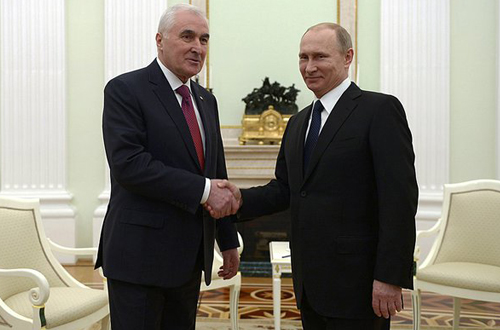Moscow, Tskhinvali Sign ‘Integration Treaty’

Leader of Georgia’s breakaway region of South Ossetia Leonid Tibilov (left) and Russia’s President Vladimir Putin (right), March 18, 2015. Photo: Kremlin
Russia’s President Vladimir Putin and leader of Georgia’s breakaway region of South Ossetia Leonid Tibilov signed a treaty on “alliance and integration” in Moscow on March 18.
In a statement released shortly after the signature, the treaty has been condemned by the Georgian Foreign Ministry as an “actual annexation of occupied Tskhinvali region” by Russia.
Putin said after the meeting with Tibilov that implementation of the treaty “is backed by serious financial resources.”
“Additional of about 1 billion rubles will be allocated in 2016 for the purpose of implementation of goals” laid out in the treaty, Putin said and added that Russia’s financial assistance to Tskhinvali amounted to over 43 billion rubles in 2008-2014.
He said that over 9 billion rubles will be allocated in 2015-2017 in frames of “investment project for social-economic development of South Ossetia.”
“Over 9 billion rubles will be directed towards realization of 36 projects in the areas such housing projects, construction of cultural and educational facilities, transport infrastructure; construction of a modern republican healthcare center is also planned in Tskhinvali,” Putin said.
Signing of the treaty comes four months after Moscow signed the agreement on “alliance and strategic partnership” with Georgia’s another breakaway region of Abkhazia. Moscow has pledged 9.2 billion rubles to Sokhumi.
After revision of the initial draft of the treaty with Tskhinvali, the final text became more similar to the one that was signed with Sokhumi. It, however, contains clauses, which envisage much deeper integration of South Ossetia with Russia than the one signed with breakaway Abkhazia.
According to the treaty with the term of 25 years, “separate units of the armed forces and security agencies of the South Ossetian Republic will become part of the armed forces and security agencies of the Russian Federation.”
It also envisages “integration” of customs service of the breakaway region with the one of the Russian Federation.
Like in case of Abkhazia, treaty with Tskhinvali envisages setting up of Joint Information-Coordinating Center of law enforcement agencies for the purpose of “coordinating” fight against “organized crime and other grave crimes.”
Russia takes commitment to “co-finance” gradual increase of salaries of employees of the state-funded entities in breakaway South Ossetia to the level existing in Russia’s North Caucasus Federal District.
Russia also pledges to increase pensions for those residents of the breakaway region, which hold Russian passports, starting from 2016, according to the treaty, which also envisages further easing of granting Russian citizenship to the residents of the breakaway region.
“I am sure that implementation of this treaty will open new page in our relations,” Putin said.
Tibilov thanked Putin for “a huge assistance” and added: “People of South Ossetia owe you.”
He invited Putin in Tskhinvali at a ceremony marking 25th university “of formation of the Republic of South Ossetia” on September 20.
“We are waiting for you as it would be the best gift for our republic,” Tibilov told Putin.
Signing of the treaty coincided with the day when Russia marks one year since the annexation of Crimea.
The United States and the European Union said in their statements on the eve of the signing of the treaty in Moscow that they do not recognize its legitimacy.
The Georgian Foreign Ministry said it “condemns so called ‘treaty’, which is directed against sovereignty and territorial integrity of Georgia, and which, like in case of Abkhazia region, represents an actual annexation of the occupied Tskhinvali region.”
Georgian President Giorgi Margvelashvili said in a statement that the treaty “further deteriorates situation created as a result of occupation” and transforms it into the stage of “annexation.”
This post is also available in: ქართული (Georgian) Русский (Russian)